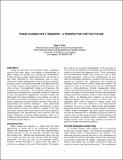PHASE CHANGE HEAT TRANSFER – A PERSPECTIVE FOR THE FUTURE
Author(s)
Dhir, Vijay K.
DownloadDHIR.pdf (1.927Mb)
Metadata
Show full item recordAbstract
During the last half of the twentieth century, significant
advances have been made in developing an understanding of
phase change heat transfer (e.g., boiling and condensation).
Further advances in phase change heat transfer will continue to
take place motivated by new technologies such as microelectronics,
thermal management in space, advanced terrestrial
and space power systems and processing of designed materials.
In the past, because of the complexity of the processes, very
often we have “oversimplified”, maybe out of necessity, the
modeling of the processes. The resulting weaknesses in our
models and correlations have continued to haunt us whenever
we have encountered new applications. In order to address the
phenomena from basic principles, in my opinion, we need to
pay attention to processes occurring at nano to micro to macro
scales, capitalizing on recent advances that have been made in
experimental and numerical techniques. These phenomena
include nucleation, evolution, merger and breakup of vaporliquid
interfaces, contact line behavior; coupling of the bulk
and surface features of the solid; and the role of nano and micro
inhomogeneties and intermolecular forces between solid and
liquid. Prediction of nucleate boiling transfer is taken as an
example to demonstrate the value of coupling different scales in
meeting the overall objective.